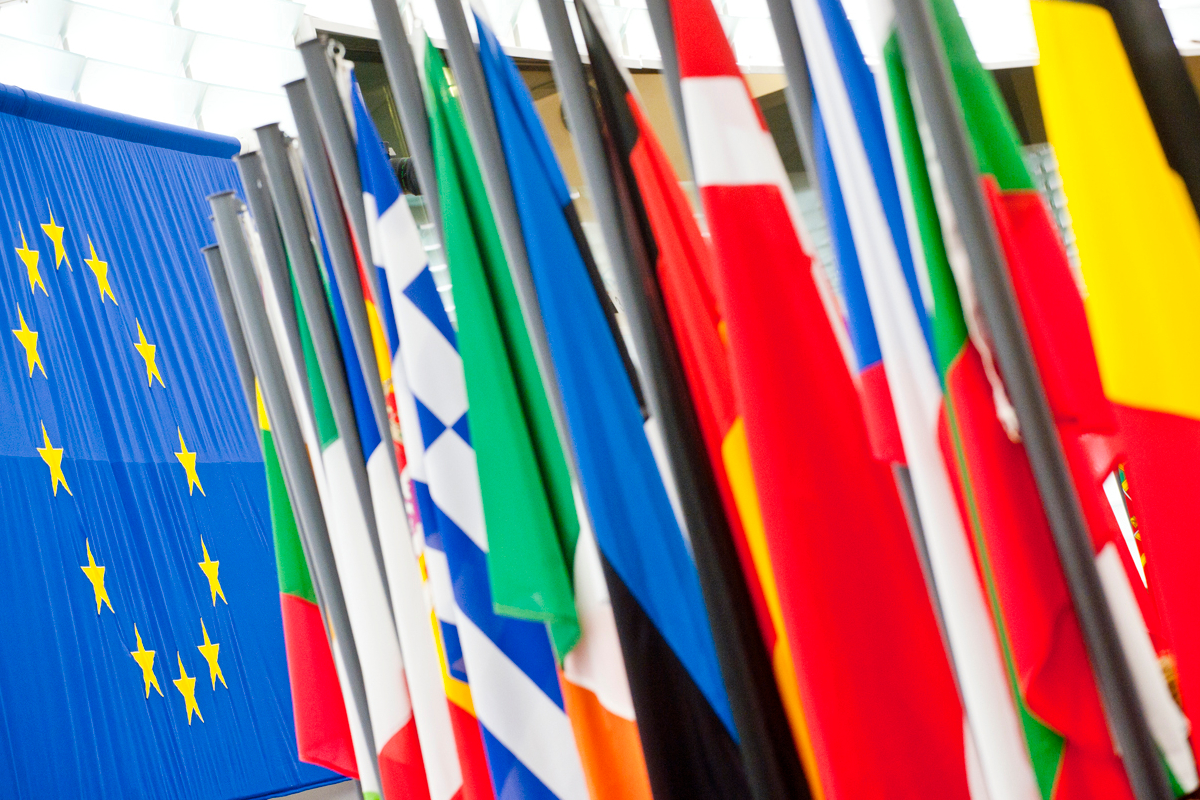Tracking the Pact: Human rights disaster in the works as Parliament makes "significant concessions" to Council
Topic
Country/Region
06 December 2023
Negotiations are close to an end on the new laws that make up the EU's Pact on Migration and Asylum, and the Council - which has consistently favoured rules that will downgrade human rights protections - appears to have largely got its way, according a document circulated by the Spanish Council Presidency yesterday. Amongst other things, the document openly admits that the Council is planning to sideline Parliament's concerns over "potential discrimination based on race."
Support our work: become a Friend of Statewatch from as little as £1/€1 per month.

Image: Julie Ricard, Unsplash
Lives on the line
“If they really pursue this New Pact, it will be against any kind of human or refugee rights. They are playing with the lives of people who are vulnerable and in danger,” said Parvin A, a woman who was severely beaten, detained and pushed back from Greece six times.
These views seem to matter little to the member states in the Council and, according to the Spanish Presidency, the Parliament - often seen by observers as the only EU institution that is likely to stand up for human rights - did not put up much of a fight.
A paper circulated by the Presidency yesterday, obtained by Statewatch and reproduced below, says "the core part of the Council mandates is being preserved in all files. This has been possible due to the fact that the European Parliament has accepted to make significant concessions."
Or, as the document states elsewhere:
"...the European Parliament showed openness to accept elements on the effectiveness of the procedures, provided that the Council shows a certain degree of flexibility on relevant points for the European Parliament, such as fairer responsibility rules, enhanced guarantees for families and minors, right to effective remedy, free legal assistance or effective monitoring of fundamental rights."
Even with these concessions from the Council, the overall result of the measures that make up the Pact are set to provide a significant lowering of human rights protections for migrants and refugees entering the EU - and, as Sara Prestianni, Advocacy Director for EuroMed Rights has put it, a situation in which "states can simply dodge their responsibilities by paying for weapons, walls, and detention camps in border states or non-EU countries with grim human rights records."
"Opening the door to human rights abuses"
The Presidency paper includes an overview of the "core part of the Council mandate," and the Presidency "is confident that they will be part of the final result of the negotiations with the EP," though notes that the Parliament's agreement to them depends on "obtaining further flexibility from the Council side."
If the Presidency's confidence is well-placed, then the situation in the coming years looks grim, according to human rights groups: the entrenchment of pushbacks; increased use of detention, including of families and children; greater risk of racial profiling within the EU; the further externalisation of European borders; lowering of procedural safeguards to increase deportations; and limiting access to legal assistance for asylum-seekers.
“The Migration Pact in its current form opens the door to human rights abuses, providing implicit and explicit EU backing for the arbitrary deprivation of liberty and severe human rights violations that have become commonplace at or near EU borders," said Michele LeVoy, director of the Platform for International Cooperation on Undocumented Migrants (PICUM).
The Presidency's view
The Presidency paper describes this situation in rather more anodyne terms.
The paper notes that there will be "an effective screening of all irregular arrivals to the EU," and "referral to the substantive procedures in a short period of time," while member states would be able to decide where precisely screening will take place.
"Moreover, the mandatory legal fiction of non-entry would be preserved for all cases," a point emphasised twice by the Presidency: "The final agreement would ensure an effective and meaningful mandatory border procedure, with full application of the legal fiction of non-entry, which constitutes a key element of the reform."
What this means in practice is that, despite people being physically present on the territory of an EU member state, the law will decree that they have not yet really entered that member state - and thus can be subject to detention and screening at the borders, with a view to swift deportation.
According to the paper, a key role for the Council will also be preserved in the complex and technocratic decision-making architecture that will be set up to govern the new EU asylum and migration system, including by deciding on "solidarity measures."
All those measures - whether that is accepting relocated refugees or providing funding to third countries for border externalisation - "would be considered as having equal value."
However, if a member state determines that it is unable to apply the new rules due to a situation of "crisis" or "force majeure," then "there should be a broad menu of derogations to respond to these exceptional situations."
Negotiating plan
The paper goes on to set out negotiating objectives for the bumper trilogue meeting scheduled with the Parliament and Commission for tomorrow, and includes a comment with regard to the possibility of carrying out "screening" within EU territory, rather than simply at the borders:
"Despite the Parliament's strong opposition, mainly due to concerns on potential discrimination based on race, the Presidency remains firm on maintaining this provision that is a strong priority for the Council."
The human rights groups making a last-ditch attempt to halt the Pact have warned that giving authorities the power to subject people already within the EU to the screening procedure will increase "the risk of racial profiling of people who live in and come to Europe, whatever their citizenship or residence status," as officials will treat skin colour as a proxy for immigration status.
According to the Presidency, the only room for negotiation on this point is the possibility for "the personal scope of such screening [to] be further clarified."
The paper also makes clear that despite the Parliament securing a "reinforced" fundamental rights monitoring mechanism, the Council will not accept monitoring of border surveillance operations - many of which of course lead to violent pushbacks of people seeking safety.
The full text of the document, which is not officially publicly available, is reproduced below (all emphasis in original).
Council of the European Union
Brussels, 5 December 2023
(OR. en)
16291/23
LIMITE
ASIM 115
JAI 1604
MIGR 435
FRONT 395
ASILE 125
NOTE
From: Presidency
To: Permanent Representatives Committee
Subject: Towards a final compromise on the Pact on Migration and Asylum – Discussion paper
Migration and asylum are European challenges that require a European response. After more than seven years of negotiations, the European Parliament and the Council are closer than ever to reach a historical agreement in this field. The time has come to seize this opportunity with full determination in order to improve the current acquis by developing more efficient and sustainable systems and to foster mutual trust among Member States in this field.
The Spanish Presidency is devoting tireless efforts to defend the Council position in the negotiations with the Parliament. Reaching an agreement in December 2023 is crucial to formally conclude the files in the current legislative term in line with the roadmap agreed with the European Parliament.
As stated during the discussions in COREPER on 8, 17 and 27 November, the Spanish Presidency reiterates that the final agreement will necessarily respect four key features of the system that is being developed: effectiveness, practicability, fairness and balance between responsibility and solidarity.
In this context, the Spanish Presidency is upholding these principles and approach in the interinstitutional negotiations. In the current state of negotiations the core part of the Council mandates is being preserved in all files. This has been possible due to the fact that the European Parliament has accepted to make significant concessions.
Preserving the key building blocks in the final compromise
To illustrate how the core part of the Council mandate is being preserved, the following section summarises most of these core elements, which the Presidency is confident that they will be part of the final result of the negotiations with the EP. The EP has made conditional its agreement on these key issues to obtaining further flexibility from the Council side.
In the final outcome, in contrast to the current status quo, there would be an effective screening of all irregular arrivals to the EU, and a referral to the substantive procedures in a short period of time.
Member States would have the flexibility to designate the locations where screening will be conducted. Another key feature would be the direct access by the relevant authorities to the databases to conduct security checks. Moreover, the mandatory legal fiction of non-entry would be preserved for all cases.
There would also be an obligation to effectively register all categories in Eurodac, be it applicants, irregular crossing, SAR cases or resettled persons. Moreover, Member States would be able to collect data of resettled persons in third countries. The retention period for applicants of international protection would be maintained at 10 years. In coherence with Screening, the law enforcement authorities would have direct access to Eurodac, avoiding thus a cascade check prior to accessing Eurodac. Finally, Member States would be able to insert security flags upon registration in Eurodac, in order to strengthen the internal security.
The final agreement would ensure an effective and meaningful mandatory border procedure, with full application of the legal fiction of non-entry, which constitutes a key element of the reform.
Regarding the overall governance on migration and asylum, the role of the Council would be preserved when it comes to decisions on solidarity measures, and specific reference to the Toolbox would be maintained. Moreover, the institutional architecture would be based on a two-level set-up, including a ministerial and a technical level. Mandatory, flexible and needs-based solidarity would be preserved, which means that all solidarity measures would be considered as having equal value and Member States would have full discretion on which measures to use. The final agreement would also include take back notifications with no shift of responsibility and the transfer time limits set out in the Council mandate.
On the crisis regulation, the final agreement should include instrumentalisation as part of the scope as well as force majeure. In general, there should be a broad menu of derogations to respond to these exceptional situations.
How to preserve the core elements and overall objectives of the Pact
As mentioned above, the European Parliament showed willing to accept all major Council’s core elements on the effectiveness of the procedures, provided that the Council shows a certain degree of flexibility on relevant points for the European Parliament, such as fairer responsibility rules, enhanced guarantees for families and minors, right to effective remedy, free legal assistance or effective monitoring of fundamental rights.
On the clear understanding that nothing is agreed until everything is agreed, the Presidency considers that following the COREPER meetings on 17 and 27 November, and after consultations with all delegations, the following elements on the different legislative files could constitute a reasonable way forward in order to seeking an overall compromise with the European Parliament.
On Screening:
- Reinforced mechanism for the monitoring of the Fundamental Rights. Provided that this mechanism does not expand its scope to border surveillance, such monitoring mechanism, drawing its inspiration from the ECBG Regulation and the Return Handbook, would contain an allegations system and provide for guarantees on its independence involving national human rights institutions, ombudspersons and international organisations. This mechanism would cover screening at the external borders and screening within the territory.
- Screening within the territory. Despite the Parliament’s strong opposition, mainly due to concerns on potential discrimination based on race, the Presidency remains firm on maintaining this provision that is a strong priority for the Council. However, the personal scope of such screening could be further clarified and thus the Presidency proposes to refer to illegally staying third-country nationals apprehended or intercepted in accordance with the Return Directive.
- Extended duration. The suggested compromise extends the period for screening from 5 to 7 days, without a possibility for prolongation.
On Eurodac:
- The Presidency suggests to postpone the amendment of the Entry Exit System (EES), through a separate and adequate legal instrument. Given the relevance of such an amendment, the Council would request reassurances from the Commission to that end.
- The Presidency is convinced of the advantages of including beneficiaries of Temporary Protection in Eurodac and is striving to finalise an agreement in this respect. This agreement may include adjusting the retention period for this category as explained hereafter. The EP, though, remains strongly opposed to this inclusion.
- Adjusted retention periods for resettled persons and beneficiaries of temporary protection. The Presidency proposes to accept an adjusted retention period for resettled persons (5 years) and beneficiaries of temporary protection (limited to the duration of such temporary protection – provided that the Parliament accepts their inclusion), while maintaining the retention period for applicants of international protection at 10 years and the Concil’s mandate on all other categories.
On the Asylum Procedures Regulation (APR):
- Mandatory border procedure. An effective and meaningful border procedure should ensure that the number of persons that would actually be channelled to the border procedure remains as high as foreseen in the Council mandate. In this sense, retaining the 20% recognition rate is crucial. Furthermore, security and fraud cases must be preserved. On the other hand, the European Parliament has strongly argued in favour of lowering the recognition rate to 10% and requested an exclusion of families with minors. Against this backdrop, and taking into consideration these constitute core elements of the Council's mandate that are being firmly upheld by the Presidency, the following suggestions are made:
- Prioritisation. When managing the adequate capacity, cases other than families with minors should be prioritised (e.g. applicants posing risk to national security or public order, applicants with high prospects of return as well as single adult applicants).
- Grounds of the border procedure. The presidency proposes to clarify the ground of misleading the authorities. In this sense, in line with the current Asylum Procedures Directive, the Presidency suggests to keep it as an optional ground for border procedure.
- Suspensive effect. Automatic suspensive effect of appeals for cases where unaccompanied minors are subject to the border procedure.
- Free legal assistance. For the border procedure, free legal assistance should be ensured.
- Duration. The duration of the border procedure will be of 12 weeks, with the only possibility to extend for four weeks for AMMR transfers.
- Monitoring of Fundamental Rights. A monitoring of Fundamental Rights mechanism should be provided in relation with the border procedure, with the possibility to assign those tasks to the monitoring mechanism provided for in the Screening Regulation.
- Safe Country Concepts.
- Consent. The consent of the applicant would not replace the connection criterion. The latter would be defined in accordance with the Council mandate.
- Effective protection. Compared to the Council mandate, for a third country to be considered safe, for some of the criteria, the presidency proposes to go back to the original Commission proposal. In particular, access to education and access to healthcare without discrimination. An effective protection should remain available until a durable solution is found.
- EU agreements with third countries. In accordance with the Council mandate, a third country will be presumed to be safe if it has signed an agreement with the EU pursuant Article 218 TFEU. In this context, the possibility to suspend that agreement, as foreseen in the Treaty, would be inserted in the text.
On the Asylum Migration Management Regulation (AMMR):
- Regarding the responsibility criteria, the European Parliament strongly defends strengthening family-related criteria and modifying the time limits for the entry criteria, as well as reinforcing meaningful links. Against this backdrop, the Presidency has defended the Council mandate, stressing this is the result of a very delicate balance. Therefore, the Presidency suggests that diplomas could be included. This new responsibility criterion would be applied only if the that the following cumulative conditions are fulfilled: a) the application is registered less than five years after the diploma or qualification was issued; b) the "diploma or qualification" is obtained on the territory of that Member State; c) attested by the Member State; d) after at least a period of one year of study; and e) online training and any other form of distant learning are not included.
- The Presidency proposes codifying the case law, including the assessment of elements subsequent to the transfer decision that are decisive for the correct application of the Regulation and possibility of the applicants to appeal the rejection to take charge an applicant. Nevertheless, this codification will be limited to family-related criteria only, meaning to Articles 15 to 18 and Article 24, as is the case for appeals to transfer decisions. The codification of this possibility as defined by the Court of Justice of the EU (see to this regard C-19/21, first and second questions and c-63/15, first question) in the operative part of the regulation would bring a harmonised approach as regards the counting of the timelines under Article 29 and be beneficial to the overall objective of the reform to enhance the efficiency of the system as well as to limit unauthorised movements between the Member States.
- Search and Rescue (SAR). The Presidency builds its compromise on the basis of the specificities of the structural phenomenon of disembarkations after SAR operations, which is specifically recognised in the Council mandate. Therefore, the Presidency proposes a compromise whereby the Commission decision identifying the Member States that are under migratory pressure would also specify those Member States which are under migratory pressure due to large number arrivals stemming from recurring disembarkation following SAR during the previous 12 months. The Commission would then specify an indicative share of the Solidarity Pool that should be earmarked (reserved) for those Member States.
On the Crisis, including instrumentalisation, and force majeure Regulation:
- Governance. While ensuring that the Council maintains a central role in the decision- making process, a two-step approach could be envisaged:
- The first step will be a Commission implementing decision that determines the existence of a situation covered under the Crisis Regulation. During its assessment, the Commission shall consult the concerned Member State.
- The European Parliament will be informed by the Commission whenever, following a request from a Member State, the first step is triggered.
- The second step will be a Council implementing decision, based on a Commission proposal that authorises the targeted derogations and solidarity measures needed to address the situation in the concerned Member State as per the Council mandate.
- The initial duration of the derogations and solidarity measures included in the Council implementing decision will be up to three months, renewable for an additional period of three months, and if the situation requires so, a new Council implementing decision will be agreed up to a maximum of six months.
- Swifter international protection determination procedures. The European Parliament had included in its mandate the prima facie international protection. During the negotiations, the Presidency has opposed to such an approach. As a result, the Parliament has dropped this proposal. As an alternative, the Presidency suggests that the Commission may issue a non-binding Recommendation establishing certain categories of applicants whose applications for international protection are likely to be well founded. In such cases, Member States would have the possibility to apply an expedited procedure to grant international protection swiftly. The implementation of this procedure will be compatible with activation of the Temporary Protection Directive as separate instruments of the Toolbox.
The Presidency invites COREPER to discuss the above package of compromise proposals with a view to finding an agreement that can be the basis for the negotiations during the trilogues of 7 December.
Our work is only possible with your support.
Become a Friend of Statewatch from as little as £1/€1 per month.
Further reading

Tracking the Pact: Derogations all round in Council's latest crisis Regulation edit
Of the five legislative proposals in the EU's Pact on Migration and Asylum, there is only one for which the Council has not so far adopted a negotiating position: the crisis and force majeure Regulation. The main purpose of the law is to set out derogations from other measures in the Pact, which are all due to be approved by next spring. The latest version of the text (published here) was up for discussion yesterday at the Justice and Home Affairs Council, which failed to reach agreement on it. Another attempt will reportedly be made on Monday.

Tracking the Pact: Presidency's proposed negotiating position on force majeure Regulation; member state comments
On 26 July the Council Presidency circulated what it intended to be the Council's negotiating mandate on the proposed Regulation addressing situations of crisis and force majeure in the field of migration and asylum. Agreement within the Council on the text remains elusive, but it is being made public here, alongside previous versions of the text and compilations of comments from member states on various issues raised by the proposal.

Tracking the Pact: New Presidency proposals on "solidarity and support measures in a situation of crisis or instrumentalisation"
The latest Council Presidency compromise text of the Crisis and Force Majeure Regulation includes new provisions on "solidarity and support measures in a situation of crisis or instrumentalisation," and changes to the proposals on the notification and authorisation procedures for member states deemed to be facing a migration "crisis" or the "instrumentalisation of migration".
Spotted an error? If you've spotted a problem with this page, just click once to let us know.

